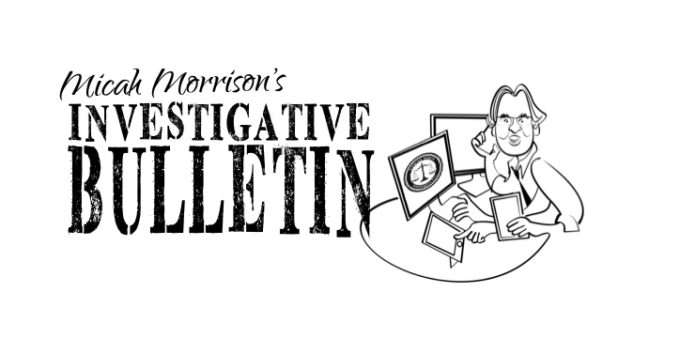Following The Trump Money
 Amid the sound and fury over the firing of FBI Director James Comey and classified conversations in the Oval Office, a significant development in the Russian connection investigations received only fleeting attention. But it’s important. Investigators are getting serious about following the Trump money.
Amid the sound and fury over the firing of FBI Director James Comey and classified conversations in the Oval Office, a significant development in the Russian connection investigations received only fleeting attention. But it’s important. Investigators are getting serious about following the Trump money.
Senator Lindsey Graham signaled the new development at the end of the May 8 subcommittee hearing of the Senate Judiciary Committee. It was quickly overshadowed by President Trump’s firing of Mr. Comey the next day.
Senator Graham asked former Director of National Intelligence James Clapper: “During your investigation of all things Russia, did you ever find a situation where a Trump business interest in Russia gave you concern?”
Mr. Clapper paused, then artfully dodged: “Not in the course of the preparation of the intelligence community assessment” of Russian meddling in the election.
Senator Graham was not deterred. “Since?” And, “At all, anytime?”
“I can’t comment on that because that impacts an investigation,” Mr. Clapper said.
Four days later, the Wall Street Journal reported that the Treasury Department’s Financial Crimes Enforcement Network, or FinCEN, would be sharing “financial records with an expanding Senate probe into possible ties between Russia and President Donald Trump and his associates.” The FBI is already making use of FinCEN data and analysis.
FinCEN is basically a gigantic vacuum machine sucking up massive amounts of global financial data. It tracks suspicious banking activity and other financial transactions for signs of criminal activity, fraud, tax evasion, terrorism and money laundering. The Patriot Act put FinCEN on steroids, elevating it as a national security and law-enforcement resource.
“The basic concept underlying FinCEN’s core activities is ‘follow the money,'” the agency notes on its website. “The primary motive of criminals is financial gain, and they leave financial trails as they try to launder the proceeds of crimes or attempt to spend their ill-gotten profits.”
The Journal report noted that Senate investigators “came across information that led them to inquire about Mr. Trump’s business ties,” marking “an escalation of the committee’s probe.” According to the Journal, investigators plan to look at a broad matrix of companies involved with Mr. Trump, possibly including “businesses owned or associated with Mr. Trump’s family members, including Kushner Cos., where his son-in-law and now senior White House aide, Jared Kushner, was previously CEO.”
News reports have linked Mr. Trump’s children to Russian money. On May 5, the prominent golf writer James Dodson told a Boston radio station that in 2014, Mr. Trump told him that he “had access to $100 million” to build golf courses. When Mr. Dodson asked Eric Trump about the remark a short while later, the Trump son replied, “Well, we don’t rely on American banks. We have all the funding we need out of Russia.”
Eric Trump rejected Mr. Dodson’s account, tweeting “This story is completely fabricated and just another example of why there is such deep distrust of the media in our country. #FakeNews”
In 2008, Donald Trump Jr. told a real estate conference that “Russians make up a pretty disproportionate cross-section of a lot of our assets.” He added, “we see a lot of money pouring in from Russia.”
Donald Trump Jr., along with his sister, Ivanka, traveled to Moscow in 2006 with controversial Russian-born real estate developer Felix Sater, in pursuit of business deals. Mr. Sater is a convicted criminal and former federal informant with ties to Russian organized crime. Yes, you read that right. Starting around 2002, Mr. Sater and his Bayrock Group partnered with the Trump Organization in several high-profile development deals. Details on this incredible story here and here.
The Trump deals with Mr. Sater and Bayrock crumbled, spawning criminal investigations and lawsuits, including a Byzantine case that may come to haunt the president. The civil tax fraud case against Bayrock alleges “a conspiracy to launder as much as $250 million on Trump projects” and “wholesale transfers of profits corruptly headed overseas.”
A July press release on the case notes that Mr. Trump was named as a material witness and that “initial investigation of the case uncovered no evidence that he was culpable.” But it adds that “new, relevant Trump and Bayrock information has surfaced, from sources including Mr. Trump himself, which may significantly change that calculus.”
Lawyers being lawyers, the claim of “new, relevant” Trump information may just be a bluff to move the case toward the finish line. And there may be nothing more than a salesman’s razzle-dazzle to the statements of the Trump sons. Suggestions that money laundering at Trump casinos indicate some sort of broad Russia-related financial conspiracy are unpersuasive. But if there is any truth to these issues, the evidence may be in the FinCEN files.
***
Micah Morrison is chief investigative reporter for Judicial Watch. Follow him on Twitter @micah_morrison. Tips: mmorrison@judicialwatch.org
Investigative Bulletin is published weekly by Judicial Watch. Reprints and media inquiries: jfarrell@judicialwatch.org.

